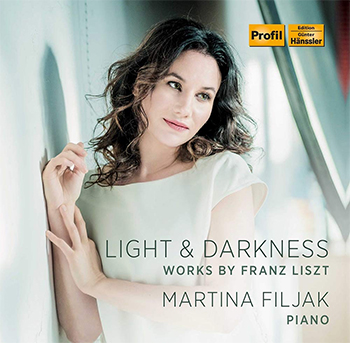by Daniel Hathaway

All too often, the idea of Liszt is more promising than the reality of his music, which is prone to bloviation and displays of shameless pianism. Filjak has chosen wisely from the composer’s vast output, mostly concentrating on his more poetic, ruminative, and religious works.
Two of the pieces, Miserere d’après Palestrina and Bénédiction de Dieu dans la solitude, contrast drama with contemplation, restlessness with peace, and Filjak paces both with unhurried grandeur and introspection.
“St. Francis Preaching to the Birds” and “St. Francis of Padua Walking on the Waves,” excerpts from Legends, are in turn picturesque — wonderfully voiced twitterings from the avian congregation — and triumphant — the Paduan saint, denied passage by boat across the Strait of Messina, lays his cloak on the water, uses one end as a sail, and crosses holding burning coals in one hand, lifting the other in blessing.
By way of narrative contrast, Filjak chose the Ballade No. 2 to offset the Palestrina piece. Two sources for its program have been suggested — one from the Gothic horror ballad Lenore (a midnight ride with a Zombie), the other from the myth of Hero and Leander. However you imagine the backstory, Filjak puts the longest piece on the album across with vivid emotional contrasts and stunning technical clarity.
Two Lisztian fantasies suggested by works from the Donizetti brothers lighten the mood toward the end of the recording. Gaetano’s Réminiscences de “Lucia di Lammermoor” is delightfully brilliant and showy, and Giuseppe’s Grande paraphrase de la marche de Donizetti pour le Sultan Abdul-Medjid Khan is as grandiloquent as a tribute to a Sultan of the Ottomon Empire should be. The former shows off Filjak’s gift for shaping melodies, the latter her wonderfully clean octaves and precise rhythms.
Listed as an “encore,” Pärt’s two-and-a-half minute Für Alina is a surprising but brilliant palate cleanser at the end of this Liszt program. Composed in 1976, the piece ended a long compositional drought while defining the Estonian composer’s tintinnabuli style. Pärt wrote that it should be played “in a calm, uplifted manner, listening to one’s inner self,” and so Martina Filjak plays it here, closing out a richly expressive album on a note of modesty and reflection.
Light and Darkness was recorded in the Immanuelskirche in Wuppertal for the Hänssler Profil label.
Published on ClevelandClassical.com May 5, 2020.
Click here for a printable copy of this article


